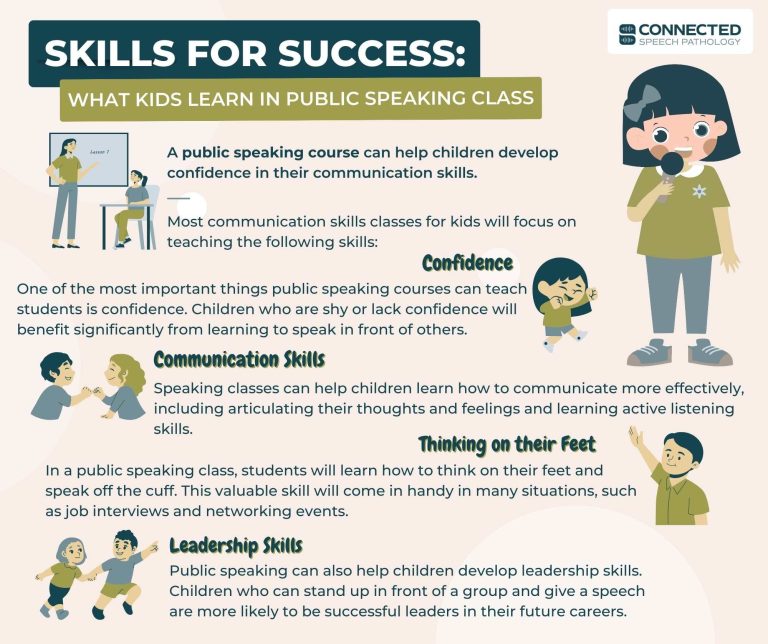What is the Scariest Part of Public Speaking?
The scariest part of public speaking is the fear of being judged or ridiculed by others in the audience. Public speaking can be a nerve-wracking experience for many.
The mere thought of standing in front of a crowd, sharing your thoughts and ideas, can trigger a cascade of anxiety-inducing emotions. Yet, it is the fear of being judged or ridiculed by the audience that often takes center stage as the scariest part of public speaking.
The worry of stumbling over words, forgetting what to say, or simply not meeting the expectations of the listeners can generate crippling self-doubt and anxiety. This fear can be paralyzing, preventing individuals from fully expressing themselves and delivering their message with confidence. However, with the right preparation and mindset, this fear can be overcome, allowing speakers to connect with their audience and make a lasting impact.
Fear Of Judgement
Public speaking can be terrifying, and one of the scariest aspects is the fear of judgement from the audience. The thought of being scrutinized and criticized can cause anxiety and hinder one’s ability to communicate effectively.
When it comes to public speaking, the fear of judgement is undoubtedly one of the scariest aspects. The mere thought of standing in front of a crowd and being scrutinized by others can send shivers down your spine. It taps into our inherent need for acceptance and triggers a deep-seated fear of rejection.
Perception Of Inadequacy
At its core, the fear of judgement stems from the perception of inadequacy. Many individuals feel insecure about their abilities and worry that they will be perceived as incompetent or unintelligent. This fear often arises from comparing oneself to others or setting unrealistic expectations.
It’s important to remember that everyone has their strengths and weaknesses. Just because you may lack experience or have some flaws does not mean you are unworthy of speaking in public. Embrace your unique perspective and trust that your audience will value the knowledge and insights you bring to the table.
Fear Of Rejection
The fear of judgement also intertwines with the fear of rejection. We all crave acceptance and fear being ostracized or ridiculed. The thought of stumbling over our words, forgetting our train of thought, or facing a negative response from the audience can be paralyzing.
However, it’s essential to realize that public speaking is not about seeking validation or impressing others. It’s about sharing information, connecting with your audience, and delivering your message effectively. Accept that not everyone will agree with or appreciate what you have to say, and that’s okay.
Instead of focusing on the potential rejection, shift your attention to the positive impact you can make through your speech. Remember that you have a valuable perspective to share, and by overcoming your fear of judgement, you can inspire and educate others.
Conclusion
Stage Fright
Public speaking can be a nerve-wracking experience for many. One of the scariest aspects of speaking in front of a crowd is the infamous stage fright. It’s that feeling of butterflies in your stomach, sweaty palms, and racing thoughts that can make even the most confident individuals feel vulnerable. Stage fright is a natural response to the fear of being judged or criticized, but understanding the physical symptoms and mental anxiety associated with it can help you overcome this fear and deliver a memorable presentation.
Physical Symptoms
Stage fright triggers a range of physical symptoms that can hinder your presentation if left unaddressed. These symptoms are the body’s response to stress and include:
- Rapid heartbeat
- Shortness of breath
- Sweating excessively
- Trembling or shaking
- Dry mouth
- Feeling dizzy or lightheaded
- Upset stomach or nausea
Experiencing these physical symptoms can make you feel self-conscious, further increasing your anxiety. It’s important to remember that these symptoms are natural and that most people in the audience won’t even notice them. Implementing relaxation techniques like deep breathing, stretching, and positive self-talk can help manage these physical manifestations and calm your nerves.
Mental Anxiety
Along with the physical symptoms, stage fright also brings about mental anxiety. Our minds can be our worst enemies, filling our heads with negative thoughts and self-doubt. Some common mental challenges associated with stage fright include:
- Feeling overwhelmed or forgetting what to say
- Worrying about being judged or making mistakes
- Fearing rejection or criticism
- Experiencing a loss of confidence
- Having difficulty concentrating or staying focused
Addressing mental anxiety begins with understanding that these thoughts are often exaggerated and not based on reality. Remind yourself of your preparation and expertise on the topic. Visualize a successful and engaging presentation. Additionally, practicing mindfulness, such as meditation or visualization exercises, can help quiet the anxious thoughts and increase your confidence before taking the stage.
While stage fright may seem like an insurmountable obstacle, it is important to remember that it is a common experience. By acknowledging and understanding the physical symptoms and mental anxiety associated with stage fright, you can develop effective strategies to overcome your fears and deliver compelling public speeches and presentations.
Loss Of Control
Public speaking can be a daunting task for many. The thought of standing in front of a crowd, with all eyes on you, can bring about a sheer sense of terror. One of the scariest parts of public speaking is the loss of control. When you step onto that stage, you relinquish the power over certain aspects that contribute to a successful presentation. Let’s take a closer look at two areas that can make you feel completely out of control during a speech: the uncertainty of audience response and technical mishaps.
Uncertainty Of Audience Response
When you’re speaking in public, you never quite know how the audience will react. Will they listen intently and engage with your message, or will they appear disinterested and dismissive? This uncertainty can be overwhelming, as you strive to connect with your listeners and leave a lasting impact. To conquer this fear of the unknown, preparation is key. Conduct research on your audience beforehand to understand their needs, interests, and expectations. Tailor your content to resonate with them, and practice your delivery to ensure you come across as confident and composed despite the uncertainty of their response.
Technical Mishaps
Another aspect that adds to the fear of losing control while public speaking is the possibility of technical mishaps. Technology is not always reliable, and the fear of experiencing a malfunction can be nerve-wracking. Consider the scenario: you’re midway through your presentation, relying on visual aids or slides, and suddenly the projector stops working or the microphone starts malfunctioning. This sudden interruption can leave you feeling vulnerable and disrupt the flow of your speech. To combat this fear, always have a backup plan. Familiarize yourself with the equipment and have a contingency plan in case of technical difficulties. Test the equipment beforehand and have alternative ways to present your message, such as printed handouts, in case of a worst-case scenario.
Public Scrutiny
Speaking in public can be daunting, but the scariest part is the intense scrutiny from the audience. The thought of being judged can create anxiety and fear, making it a challenging experience for many.
Being Vulnerable In Front Of Others
One of the scariest parts of public speaking is the feeling of being vulnerable in front of others. When we step onto a stage or stand in front of a room filled with people, we expose ourselves to judgment and criticism. All eyes are on us, and our every word and movement is under scrutiny. This can create a constant fear of making mistakes or being perceived negatively.
Social Media Backlash
Another aspect of public scrutiny that adds to the fear of public speaking is the potential for social media backlash. In today’s digital age, anyone with an internet connection can share their opinions and criticisms online. Even if the audience members themselves don’t openly criticize us, there is always the fear that someone may take to social media to voice their negative thoughts.
- This fear intensifies when we consider that online platforms can amplify negativity and reach a much wider audience.
- A single negative comment or review can have a lasting impact on our reputation and self-confidence.
- Additionally, social media has made it much easier for people to be harsh and hide behind the anonymity of their screens, leading to cyberbullying and trolls.
In order to protect oneself from such scrutiny, many speakers may feel tempted to play it safe and avoid taking risks in their speeches. They may hold back their true thoughts and ideas, fearing that they’ll be judged or criticized for having a unique perspective.
However, it is important to remember that public speaking is a valuable opportunity for personal growth and making an impact. While the fear of public scrutiny can be daunting, it is also a chance to develop resilience and confidence in the face of criticism.
Impact On Reputation
One of the scariest parts of public speaking is the impact it can have on your reputation. Negative perception and professional consequences are just some of the challenges that can arise when speaking in public.
Negative Perception
When speaking in front of a large audience or even a small group, it’s natural to worry about how you are being perceived. The fear of being judged or criticized can be overwhelming, causing anxiety and self-doubt to creep in. If you stumble over your words or struggle to convey your message effectively, it can lead to a negative perception of your abilities.
People may perceive you as lacking confidence, knowledge, or even professionalism. This negative perception can have lasting effects on your reputation, both personally and professionally. It can be challenging to overcome negative first impressions, and your reputation may suffer as a result.
Professional Consequences
The impact of public speaking on your reputation can have significant professional consequences. If you frequently speak in public as part of your job or industry, a negative perception can hinder your career progression and limit opportunities for growth.
Organizations and employers often look for individuals who can represent them well in the public eye. If your speaking skills are perceived as lacking, it can reflect poorly on your professionalism and ability to effectively communicate important information or ideas. This can result in missed promotions, restricted responsibilities, and limited networking opportunities.
Furthermore, if your reputation takes a hit due to poor public speaking skills, it may be challenging to repair the damage. It can take time and effort to rebuild trust and convince others of your competence and expertise.
Overall, the impact on reputation is one of the scariest parts of public speaking. Negative perception and professional consequences can hinder your personal and professional growth, making the fear of public speaking all the more daunting.
Frequently Asked Questions Of What Is The Scariest Part Of Public Speaking?
Faq 1: How Do I Overcome Fear Of Public Speaking?
Start by practicing in front of a mirror, then gradually build up to small audiences.
Faq 2: What Are Common Fears Associated With Public Speaking?
Fear of forgetting your speech, being judged negatively, and experiencing stage fright are common fears.
Faq 3: How Can I Make Public Speaking Less Intimidating?
Prepare thoroughly, focus on connecting with your audience, and use visual aids to enhance your presentation.
Conclusion
Public speaking can be terrifying, but understanding the scariest parts of it is the first step towards conquering this fear. Acknowledging the anxiety it brings and learning how to manage it effectively can make all the difference. By practicing, preparing thoroughly, and focusing on connecting with your audience, you can overcome the scariest aspects of public speaking.
Remember, it’s okay to be nervous, but with time and experience, you can become a confident and compelling speaker. Embrace the challenge and watch your confidence soar.


